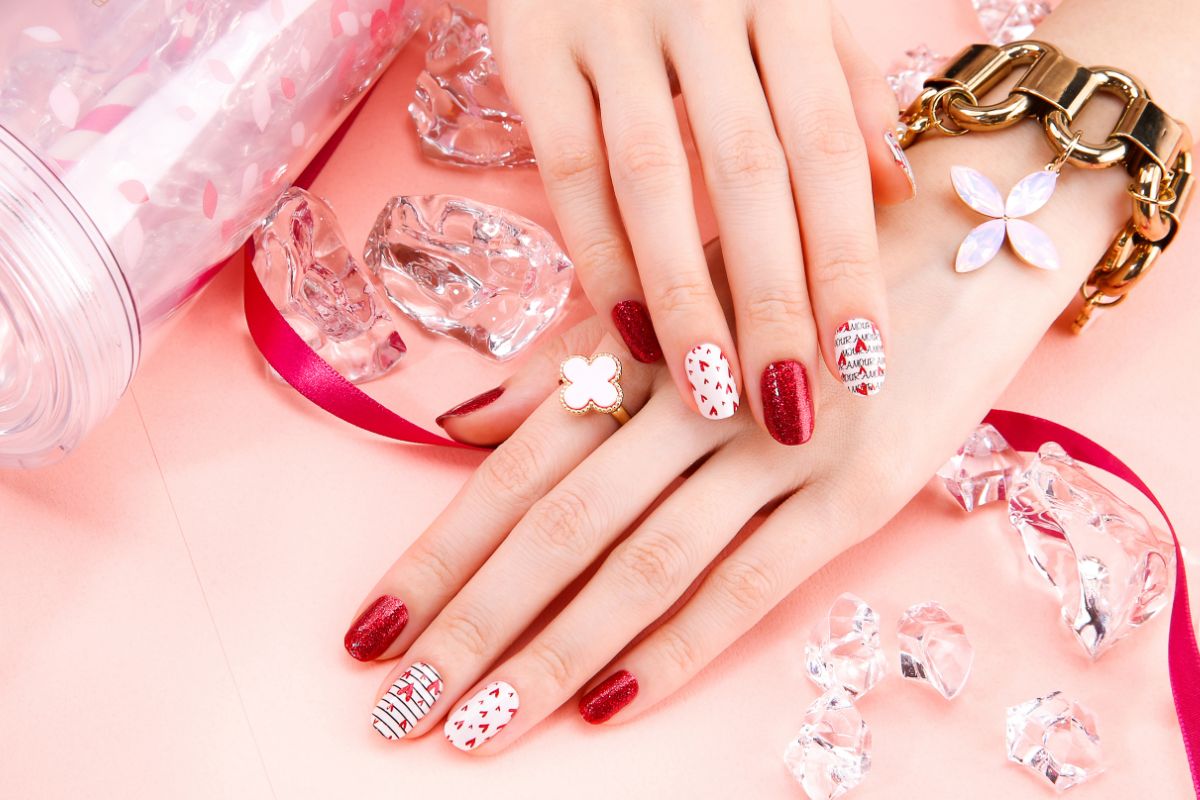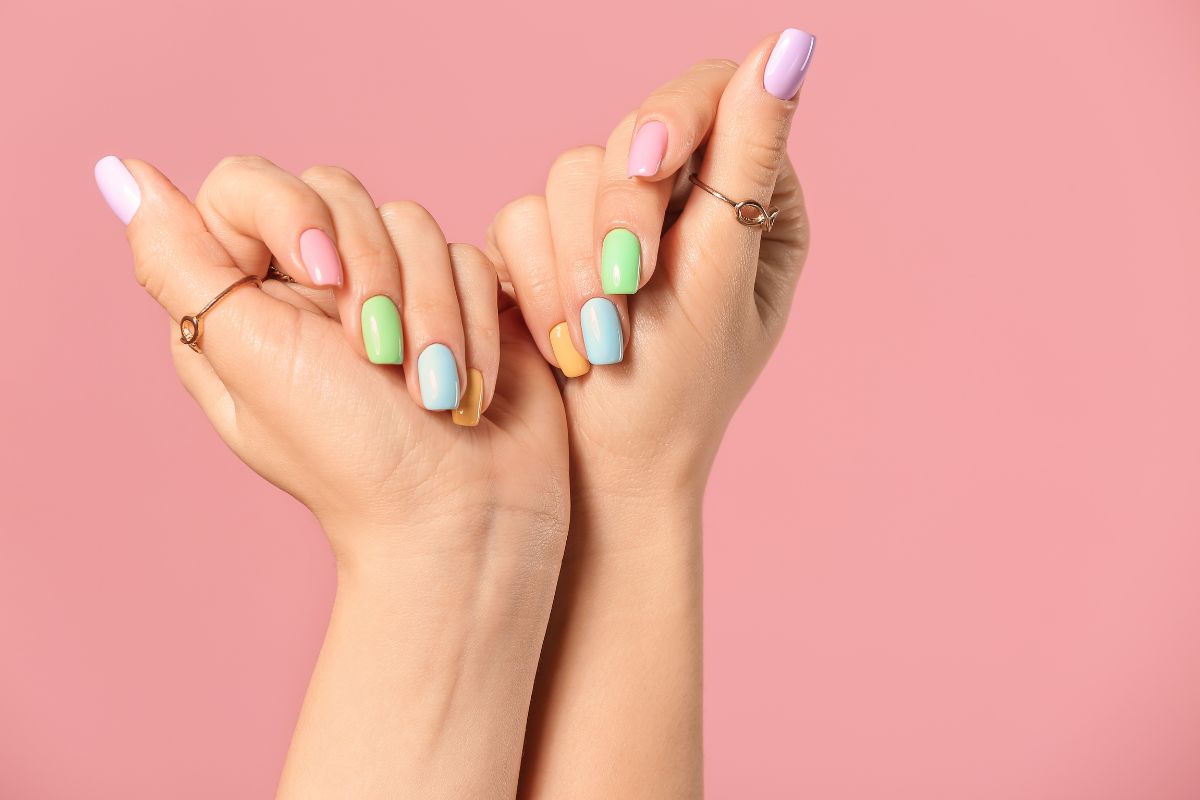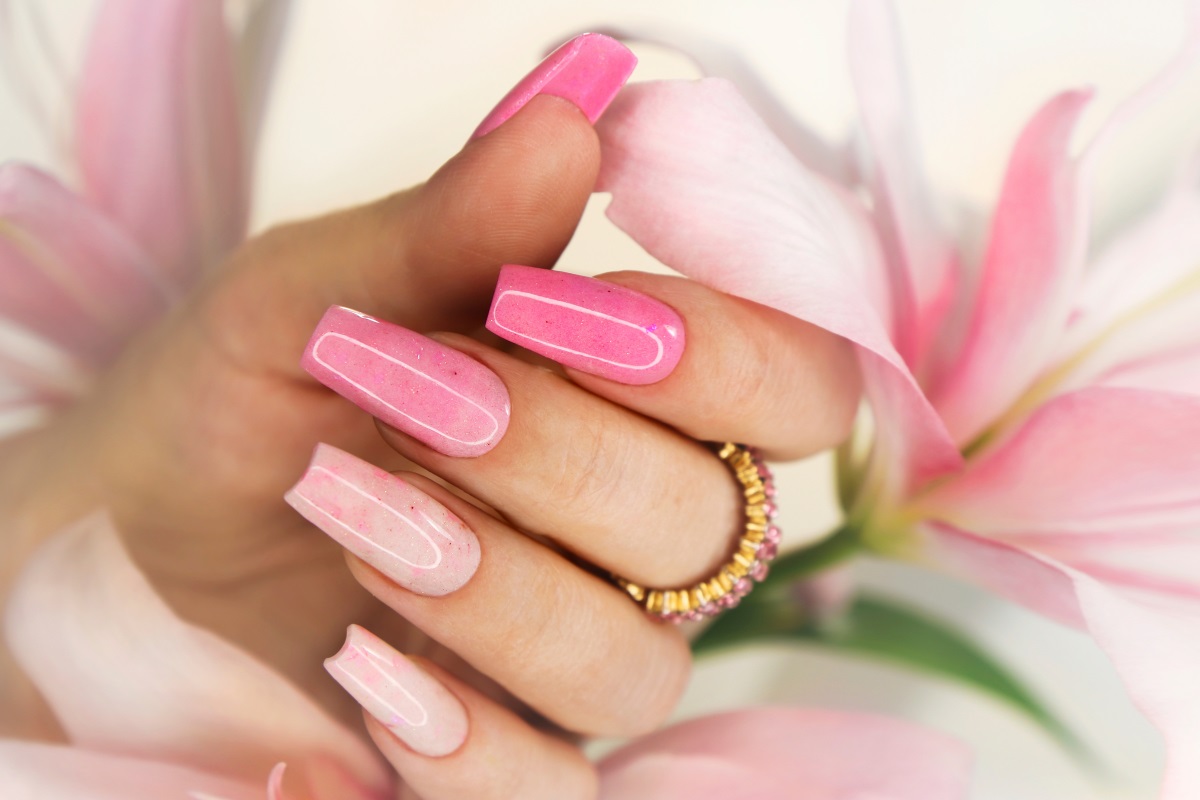What Can I Use Instead of Acrylic Nails? 10 Best Substitutes
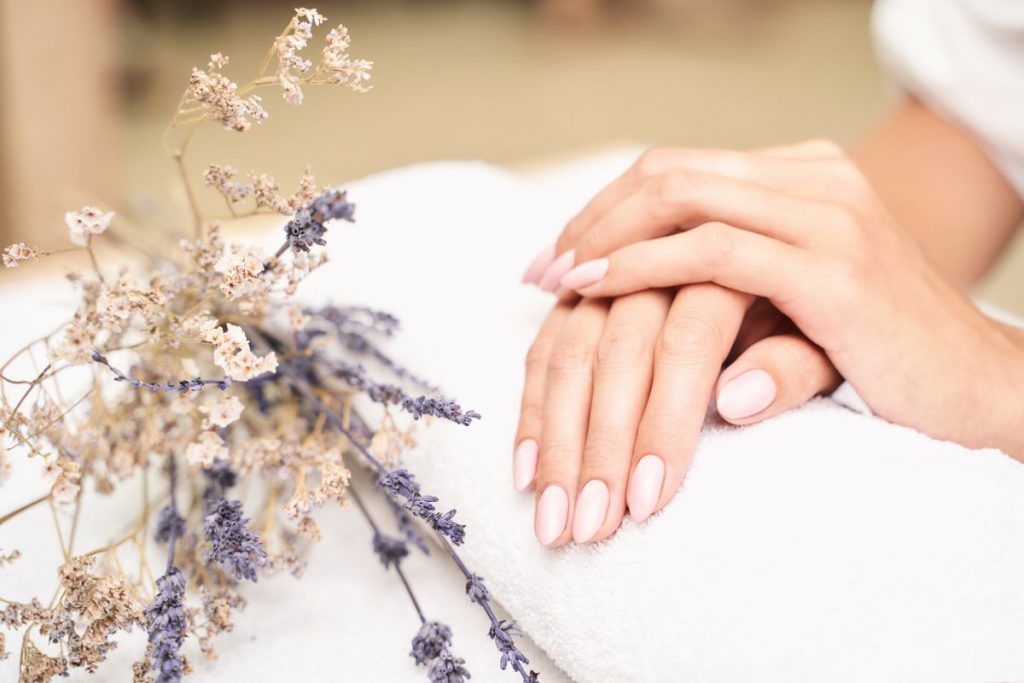
Published October 13, 2023
Ladies know how a great-looking set of nails makes you feel many things. It makes us happy, confident, beautiful and feminine. The act of getting your nails done is more than a grooming ritual. It is a beauty habit that makes us feel good about ourselves.
With this comes the rise of acrylic manicures. Acrylic nails are false nails and long-lasting enhancements that would not break easily. A set can last for a month with good care. The typical nail polishes do not have a chance on them. No wonder it became famous for women who love looking at their polished hands. It does bring glamor to women’s lives.
Yet, acrylic nails have a lot of not-so-good traits about them. They are tedious to apply. They are expensive. They use a lot of harsh chemicals. Moreover, they are not recommended for those with fragile, weak nails. These drawbacks are why some individuals slowly move away from this once-beloved nail enhancement. Thankfully, there are other great substitutes.
Continue reading as we’ll discuss all the ten healthier and better alternatives to acrylic nails. Your nails should not suffer for the sake of beauty. Let’s start.
What Are Acrylic Nails?
Acrylic nails are a blend of powder and liquid monomers. They are blended into a clump of dough, molded onto the nails with a brush, and air-dried. They do not demand a lamp to cure. They are great for changing the shape and extending your nails.
Acrylics are much stronger than traditional nail polishes. They are more durable. If you want to extend your nails, they are perfect for you.
What Are the Drawbacks of Having Acrylic Nails?
1. Damage to natural nails
The act of applying and removing acrylic nails is quite damaging. It is not suitable for natural nails. It may introduce thinning, weakening, and even breakage of them.
2. Allergic reactions:
Some individuals may be allergic to the chemicals used in acrylic nail products. They usually contain adhesive and liquid monomers. It may trigger various skin reactions. The two of which are redness and irritation.
3. Infection risk
Bacteria or fungus can grow underneath improperly maintained and cared-for acrylic nails. It can lead to infections such as nail fungus.
4. Maintenance and cost
Acrylic nails demand regular maintenance and fill. The two are non-negotiable if you want to keep them looking their best. It will take a chunk of your time. Also, it is expensive. You will need to visit a salon frequently.
5. Limitation on activities
Acrylic nails can also hinder you from performing certain activities. Having them can make it challenging to type on a keyboard. They cannot assist you in opening cans. Also, you can’t do tasks that require fine motor skills.
What Can I Use Instead of Acrylic Liquid: Top 10 Alternatives
1. Gel Nail Extensions
Gel nail extensions are lighter and healthier for your natural nails. They are also safer because they do not use so many harsh chemicals. They are highly durable and long-lasting. They won’t lift and fade quickly.
Acrylic nails tend to have chemicals such as methyl methacrylate and toluene. Both of which can harm your natural nail plates. On the other hand, gel extensions do not use so many chemicals, which makes them a lot better.
The tips of them are also lighter than their acrylic counterparts. They put less pressure on the nail bed. As a result, they feel softer and more natural.
Also, gel applications are easier and quicker to apply. It will cut the amount of time you have to spend in a salon. The builder gels for them are ready to use. In acrylics, you have to ensure that you mix the powder and liquid via an accurate ratio.
Finally, you have been mindful of the time in acrylics. You have to start applying before the powder and monomer begin to harden. With gel, you are in control, and you can take your time. You can get any design done before you cure it in the lamp.
2. Press on Nails
Press-on nails are designed with false nails. They can be applied directly onto your nails via adhesive or nail glue. These nails can easily be attached to your natural nails. Within minutes, you can have an amazingly crafted manicure.
Pressing on nails is very quick and easy to apply. It will only take 10 minutes or less. You can apply them right at home. It doesn’t use too many harsh chemicals. You just need nail glue. Some brands may even have their own built-in adhesive.
These are very affordable. They are much cheaper than acrylics and gel extensions.
They are easy to remove. You will just need to soak them in acetone for 1 minute. Then, start peeling them off.
Finally, they can be reused.
3. Dip Powder
Dip powder, commonly termed SNS, is a manicure system that you can use as a substitute for acrylic nails. The system works by dipping or brushing your nails in a very fine-colored powder. Afterward, apply a clear sealant on top to cover it.
Dip powder is usually used to make simple manicures. Yet, with the use of nail tips, they can be employed to make nail extensions.
It is swift and easy to apply. Compared to acrylic nails, it is also much better for your health. It doesn’t have any harsh chemicals.
Also, some brands of dip powder add calcium and vitamins to it. It aids in promoting more robust nail growth. It is also extremely long-lasting and durable. It doesn’t chip and peel easily. It can also last a month.
4. Gel Nail Polishes
Gel Nail polishes are another impressive substitute for acrylics. They are durable. They also look just as good. They are cheaper, easier to apply, and gentler on your nail beds.
Gel polishes are just like conventional nail polishes. Yet they are more durable and are cured using a UV lamp. They can last a good three weeks without peeling and chipping.
5. Nail Stickers
Nail stickers are nail wraps and polish strips in other terms. They are specially crafted stickers. They are pasted on your nails.
These are best if you want impressive nail art without going over budget. They are very affordable. Also, excel on accessible applications. They also do not need any maintenance or elaborate care routine.
The main drawback, yet, is that they are not very durable. They won’t last as long as acrylic or other nail products.
6. Silk nails
You can find silk nails as an alternative to acrylic manicures. The working method of it is applying a layer of silk on the nail bed. After that, you can lay a resin layer to form a coating. You can make beautiful designs on them.
Silk nails are not a good option if you are leading an active lifestyle. Such as regular gym runs or being an athlete. They are not durable. You’ll have a hard time making it last.
7. Fiberglass nails
Fiberglass is an excellent option for those with thin and short nails. A fiberglass sheet can be applied to give a more glossy nail finish. A thin mesh strip acts as a fiberglass. It will introduce a hard layer on your nails’ transparent look.
8. Solar nails
Artificial nails that are usually clear or pink are known as solar nails. They are healthy. They are made up of acrylic and gel. They also can last up to six weeks. They do not need UV light treatment.
Solar nails provide natural enhancement of the nail. It did not have any discoloration, and it can be removed easily.
9. Rubbing alcohol
Rubbing alcohol can be applied as an acrylic liquid substitute. It will replace the use of monomers. It is a clear, colorless solution that quickly evaporates. It suits those who want a quick and easy manicure.
It also has antiseptic properties. It is excellent for cleaning the nails before employing acrylics. Yet, it can be drying. Make sure to use a cuticle oil or moisturizer before your manicure session.
10. Polyester resin
Polyester resin is a great way to achieve the same effect as acrylic nails. But, it is without the harsh chemicals. It is also more budget-friendly. Most users describe it as having a salon-quality manicure without the price tag.
How to Use Acrylic Powder Without Acrylic Liquid?
Using acrylic powder without acrylic liquid is often not recommended. Acrylic liquid is a vital component in the acrylic nail application process. It is responsible for activating the acrylic powder. It creates a solid and durable bond between the powder and the natural nail.
Yet, if you’re persistent in using acrylic powder without the liquid, you can try our guide below:
1. Prepare your nails
Begin by cleaning and shaping your nails as you would typically prior to applying any nail products. Ensure they are free from any oils or residue.
2. Apply a base coat.
Lay a clear base coat on your nail bed to make a smooth surface. It makes the acrylic powder easy to attach. Allow it to dry completely.
3. Dip your brush in water.
Instead of using acrylic liquid. Use water. Dip your brush in water and shake off any excess moisture. It will act as an alternative to the acrylic liquid.
4. Dip the brush in acrylic powder.
After dampening your brush with water, dip it into the acrylic powder. Ensure to tap off any excess.
5. Apply the powder to your nails.
Apply the acrylic powder onto your nails in thin layers via a damp brush. Continue the process until you achieve the desired thickness and shape.
6. Shape and file
Shape and file your nails once the acrylic powder has dried. It will help you realize your desired length and shape.
7. Seal with a top coat.
To protect and seal the acrylic powder, employ a layer of clear top coat. It will give your nails a glossy effect. Also, it aids in extending the war of the acrylic powder.
What to Use Instead of Monomer for Acrylic Nails?
When it comes to using a substitute for monomer for acrylic nails, there are a few options to choose from. Yet, keep in mind that they may not render the same level of durability and longevity as using a proper monomer.
1. Dip powder activator
A dip powder activator is a common alternative to a monomer. It can be used to activate dip powder for acrylic nails. It performs well. It helps in making a solid bond between the powder and the nails.
2. Rubbing alcohol
Alcohol can be used as a substitute for monomer. It is commonly found in many beauty products. Like the dip powder activator, it also bonds the powder and the natural nail.
3. Nail glue
Nail glue can act as an adhesive material. It can be used as a replacement for monomers. Yet, it’s crucial to note that nail glue alone may not give the same strength and durability. It is as opposed to traditional monomer.
4. Acrylic gel
Acrylic gel is another replacement for monomers. It is a thicker gel-like substance that excels in making acrylic nails without the need for monomers. Yet, it may require a different application process than conventional acrylic liquid.
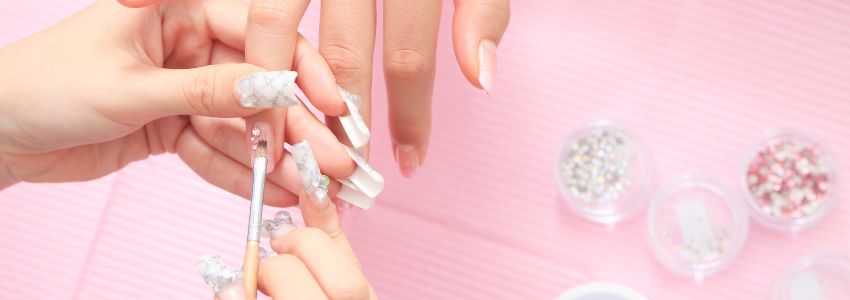
Frequently Asked Questions About What Can I Use Instead of Acrylic Liquid
1. Can I make acrylic liquid at home?
You can undoubtedly make acrylic liquid at home. One standard recipe involves using acrylic powder, rubbing alcohol, and a glass jar.
2. Can I use water as a monomer?
Water cannot be used as a substitute for monomers in acrylic nails. Monomer is a specific liquid solution. It is designed to react with the acrylic powder to yield a robust and long-lasting bond. Water does not have the same chemical properties as water.
3. Can you mix the acrylic powder with water?
Mixing acrylic powder with water to create a workable gel for nails is possible. Yet, using water may result in subpar performance. It may not perform strongly for acrylic nails.
4. Can I use gel polish on acrylic nails?
Yes, you can use gel polish on acrylic nails. Doing so can provide additional durability and a longer-lasting manicure.
Our hands can tell a lot about us. So, I might as well make it pretty. Make it a head-turner. Make it an extension of your personality. With our guide, you’re on your way to your next nail salon trip educated. You now know the alternatives to acrylic nails that are much better and healthier. We don’t want brittle nails, right?
Lease Salon Space In Royal Palm Beach Florida
Fulfill your dreams and be your own boss when you lease salon space in Palm Beach Florida with us. Our beautiful salon spaces come with complimentary laundry and cleaning services and a flexible lease agreement you can afford. Our salon suites come with many amenities including free cleaning service, televisions, storage space, and more. Contact us now to book a tour or learn more.

Fact Checked By Experts
Our team of internal experts diligently fact-checked this content to ensure accuracy and reliability. Find detailed information about the rigorous editorial standards we uphold for our website.

About The Author
I’m Tracy Gorman, a seasoned writer. My passion lies in crafting engaging articles that impart valuable knowledge. While I specialize in lifestyle, beauty, and health, I’m adept at tackling any subject.
